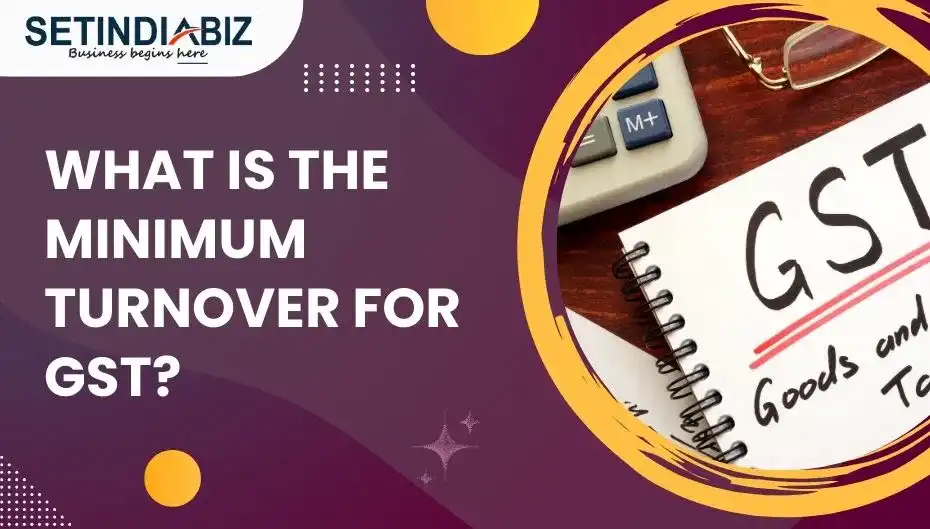What is the Minimum Turnover for GST?
Overview : The minimum turnover limit for GST is the limit exceeding which it becomes mandatory for businesses to meet GST compliances. This includes GST registration, GST payment, and GST return filing. It is calculated as aggregate annual turnover which adds up the values of inward and outward taxable, tax-exempted, export, and interstate supplies. It’s taken into account every financial year.
GST registration turnover limits are not the same for all categories of businesses. It varies for merchandise and service-based businesses. While the former has an increased limit, the latter has a lower limit of the GST threshold. Additionally, keeping in mind the usual smaller size of businesses in North-Eastern and Hilly states, their GST turnover limits have been kept lower compared to the businesses in other Indian states. Further, there are certain categories of businesses for which GST compliance is mandatory regardless of the turnover limit.

Who is Applicable to Pay GST?
GST applicability in India depends on the turnover of a business. The term used for the same is the “Annual Aggregate Turnover”. Before we proceed to understanding its applicable limits, let’s first understand its meaning as it forms the whole basis of the GST threshold limit.
Aggregate annual turnover is the total added value of all taxable inward and outward supplies, tax-exempt supplies, exported supplies, and inter-state supplies. It excludes the values of inward supplies where tax is charged via the reverse charge mechanism and non-taxable supplies. Once the aggregate of these values are calculated, the resultant is used to determine the GST applicability limit for registration and payment, both in the regular and the composition GST scheme.
What is the GST Minimum Turnover Limit?
The minimum GST turnover limit is used to determine whether a business is liable to pay GST or is exempt from this requirement. It is calculated on the basis of aggregate annual turnover, which is the cumulative value of taxable, tax-exempt, export, and inter-state supplies.
A business, regardless of its structure, is eligible for GST registration, only if it exceeds Rs.40 lakhs in case of merchandise supply, and Rs.20 lakhs in case of services supply. However, the limits are lower for the North-Eastern and Hilly states. The GST turnover limit for businesses in these special category states remains Rs.20 lakhs in case of merchandise businesses and Rs.10 lakhs for service-based businesses.
| Annual Aggregate Turnover Limits | Type of Business |
|---|---|
| Above Rs.40 Lakhs | Merchandise Business (Normal Category States) |
| Above Rs.20 Lakhs | Service-Based Business (Normal Category States) |
| Above Rs.20 Lakhs | Merchandise Business (North-eastern and Hilly States) |
| Above Rs.10 Lakhs | Service-Based Business (North-eastern and Hilly States) |
GST Taxpayers exempted from Minimum GST Turnover Limit
Despite prescribing a threshold limit for GST registration and compliance, the government has kept certain businesses exempt from this requirement. These businesses must mandatorily pay GST even if their turnover falls below the prescribed limits. To put in simple words, GST registration and compliance for businesses in this category is mandatory, regardless of their turnover limits. Here’s the complete list of these businesses:
- E-commerce operators/ aggregators
- Businesses selling on e-commerce platforms
- Casual Taxpayers
- Business non-resident in India
- Importers & Exporters
- Taxpayers under GST Reverse Charge Mechanism
- Taxpayers registered under the older tax regime
- Businesses engaged in Inter-state supplies of goods & services
- Service Providers providing information & online databases services (OIDAR)
What happens if Businesses Exceed the Minimum Turnover for GST?
If businesses exceed the minimum turnover for GST, they shall be eligible for GST compliance on a regular basis. This will continue unless the limits fall below the threshold in a particular financial year. This is because GST turnover is calculated on an annual basis. Here is a list of GST compliances businesses have to meet once they exceed the prescribed GST turnover limit:
- GST Registration
- GST Payment
- Filing GST Return
- Submitting GST Invoices and E-way Bills
- Submitting annual GST Reconciliation Bill
Conclusion
GST registration limits have been raised from the earlier threshold to exempt smaller businesses from the burden of GST compliance and payment. When GST started in India, merchandise businesses had to register for it if their turnover had exceeded Rs.20 lakhs, in the current regime this limit has been raised to 40 lakhs. This has been done so that small businesses can focus and reinvest in their growth instead of bearing the expenses of tax compliances. However, no changes have been made in the GST registration limits of services business, which is still Rs.20 lakhs, same as the older limit.